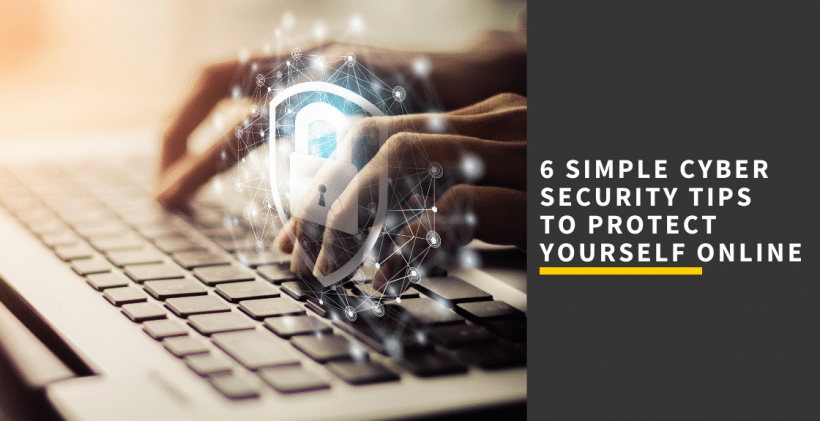It seems that every other day we read in the news that there has been another hack or security breach. Though it is more troubling to learn that many of these attempts are successful due to human error. Education and awareness are critically important in the fight against cybercriminal activity and preventing security breaches. That’s why we’ve put together this list of 6 simple cyber security tips that you can implement to increase your online security:
1. Use strong passwords that are unique for every login
One of the easiest ways hackers steal information is by getting a batch of username and password combinations from one source and trying those same combinations elsewhere. But it’s also one of the easiest ways you can enhance the security of your system. Here are a few tips:
- Your passwords should be at least 8-15 characters, though the maximum length is 64 characters.
- Don’t use the same password twice.
- The password should contain at least one lowercase letter, one uppercase letter, one number, and at least four symbols but try not to include the following “&%#@_”.
- It is good practice to update your passwords every 30-180 days, with 6 months being the maximum.
You can easily use a password management tool, such as Apple’s ‘keychain’, Lastpass or Keeper, to keep track of your passwords safely.

2. Use two-factor or multi-factor authentication
Passwords can only provide so much protection. Using two-factor or multi-factor authentication adds an additional layer of security to the standard password method of online identification. These extra layers can include a Personal Identification Code, another password or even fingerprint.
Two-factor authentication can be a pain, but it absolutely makes your accounts more secure. If the data or personal information in an account is sensitive or valuable, and the account offers two-factor authentication, you should enable it. Popular websites like PayPal, Facebook require an authentication app or mobile phone number to verify.

3. Make sure your software is up to date
We’re all guilty of pressing the ‘remind me later’ button when prompted to update our software, but this could be leaving your device vulnerable. One of the most important cyber security tips to protect against ransomware is patching outdated software, both for operating systems, and applications.
This helps remove critical vulnerabilities that hackers use to access your devices. Top anti-virus tools include software updates to keep your system and security updated and help prevent any cyber attacks. Make sure you turn on automatic system updates for your device today to make sure your device is not left exposed.

4. Backup important data regularly
Often an overlooked step in online security, but a very important one – especially when it comes to business. Every business, big or small, should have a sound data backup implementation plan and strategy. If all of your data is stored in one place, if you become a victim of ransomware or malware, the only way to restore your data is to erase your systems and restore with a recently performed backup.
Top IT and security managers advise people to follow the “3-2-1” backup rule, which is essentially, three copies of your data on two different types of media (such as local and external hard drive) and one copy in an off-site location (such as cloud storage).
5. Be wary of public Wi-Fi
You should avoid using public Wi-Fi without using a Virtual Private Network (VPN). This is because the VPN will ensure the traffic between your device and the VPN server is encrypted. This will make it much more difficult for a cybercriminal to obtain access to your data on your device. If you don’t have access to a VPN when security is important, use your mobile data.

6. Educate yourself on phishing scams
Phishing scams usually entail an attacker posing as someone you know or recognise (such as a friend or large corporation) in order to trick the recipient into divulging important information. This can be clicking a malicious link or opening an attachment that infects the user’s system with malware – often leading to a ransomware attack. Here are a few things to remember:
- Bottom line – Don’t open an email from someone you don’t know.
- Know which links are safe and which are not – you can hover over a link to discover where it directs to.
- Always double check the senders email address – are there any grammatical errors or does the address look suspicious?
- Malicious links can come from friends who have been infected too – if you weren’t expecting to hear from them, perhaps send them a message to check.
- Take your time to check the email – Many ‘urgent’ emails are scams tricking you by causing you to panic and share personal information.
If you’re still unsure, Norton have a brilliant guide with examples to help you identify phishing scams.
Bonus: Cyber Insurance
No matter how much protection you add to your business, there is always a chance you could fall victim to cybercrime. However, with a comprehensive insurance policy, your business will be covered from both losses sustained by a breach as well as any liability for damages that may be claimed by a third party.
So, is your device and data protected from cyber attacks?
At Cyber, we understand that security is paramount to all business; particularly in a world of growing dependence on hosted services and unknown internet connectivity. If you would like some advice on how to protect your home and business online, contact our dedicated team today.

